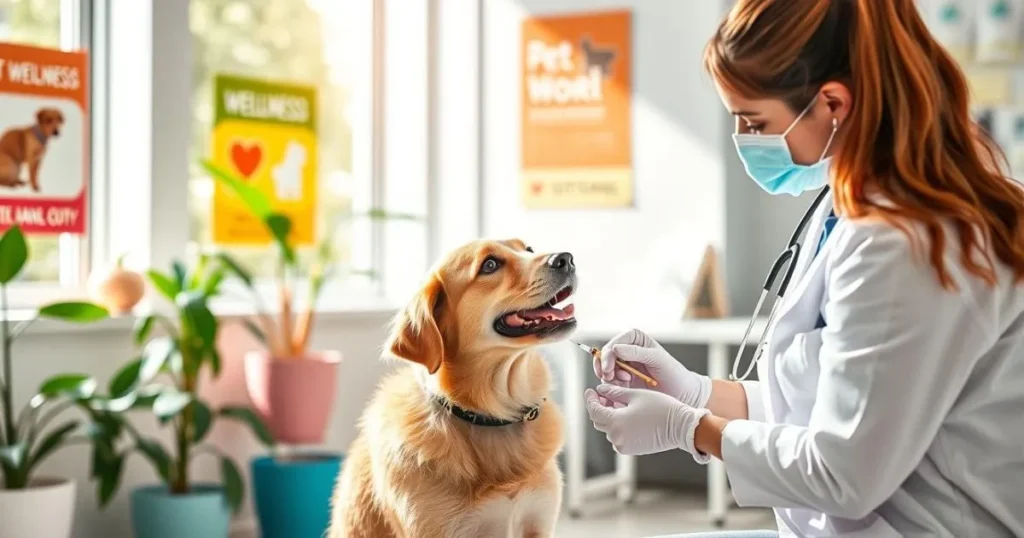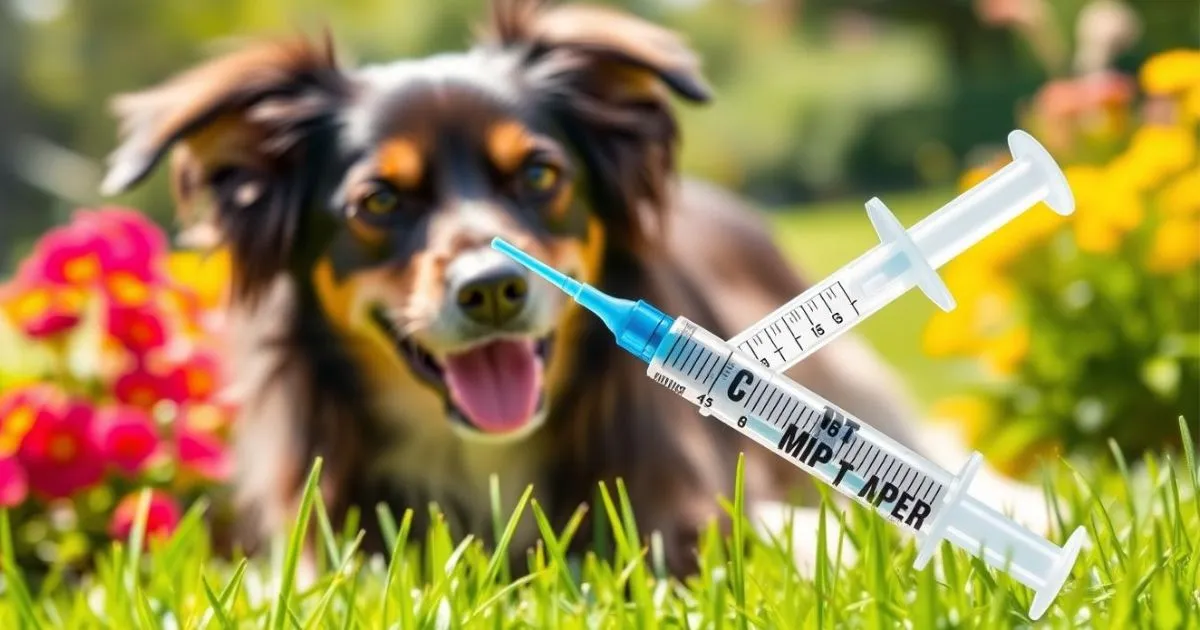As a devoted pet parent, you want your furry friend to be healthy and safe. Ensuring your dog gets the right vaccinations is crucial. The canine distemper vaccine is key. It protects your dog and keeps the whole dog community safe.
Table of Contents
Canine distemper is a contagious and dangerous virus.It affects your dog’s respiratory, gastrointestinal, and nervous systems.. Symptoms include watery eyes, fever, seizures, and paralysis.
This disease has no cure and can lead to long-term health issues or even death. But, there’s good news. The canine distemper vaccine offers strong protection.
By keeping your dog’s vaccinations up-to-date, you can prevent this deadly illness. This way, your dog can live a long, healthy life with you. Don’t let fear of distemper ruin your bond. Stay proactive with your dog’s vaccinations for peace of mind.
Understanding Canine Distemper: A Serious Threat to Dog Health
Canine distemper is a contagious and deadly virus that affects dogs and other animals. It causes serious illness in the respiratory and nervous systems. Without treatment, it can be fatal. So, distemper prevention is key for pet owners and vets.
How Distemper Virus Spreads Between Animals
The virus spreads through direct contact or airborne transmission. Dogs can get it from infected animals or wildlife like foxes and raccoons. They can also catch it from shared items. Keeping up with veterinary care and responsible pet care helps stop its spread.
Common Signs and Symptoms of Infection
- Watery eye and nasal discharge
- Fever
- Coughing and lethargy
- Vomiting and loss of appetite
- Neurological complications like seizures and paralysis
The disease can severely harm a dog’s systems. Early treatment is vital for managing symptoms and improving survival chances.
Risk Factors and Vulnerable Populations
All dogs can get distemper, but puppies and unvaccinated dogs are more at risk. The canine parvovirus vaccine is crucial for protection. It helps keep dogs safe from this serious disease.
“Vaccination has significantly decreased the occurrence of canine and feline distemper in regions with high vaccination coverage.”
Knowing about canine distemper and how to prevent it helps keep dogs healthy and happy.
The Importance of Canine Distemper Vaccine in Prevention
The canine distemper vaccine is key to keeping your pet healthy. It fights off the deadly canine distemper virus (CDV). This virus is a big problem in animal shelters.
Vaccination is crucial because CDV outbreaks can be very bad. The virus can hide in dogs for 1-2 weeks. Even after they get better, they can still spread the virus for months. This puts other pets at risk. By vaccinating more dogs, we can protect everyone.
The vaccine is given as part of a combo shot called DHPP. Puppies need shots starting at 6-8 weeks old.They require boosters every 3-4 weeks until they reach 16 weeks of age. Adult dogs also need regular boosters to stay safe.
- Canine distemper is a highly contagious and potentially fatal viral disease that affects dogs and other carnivores.
- The canine distemper vaccine is a crucial component of your pet’s wellness routine, providing essential protection against this serious illness.
- Vaccination helps create community immunity, reducing the overall prevalence of the disease and protecting vulnerable populations.
Keeping your dog’s vaccinations up-to-date is a big step in protecting their health. Consult your vet to determine the ideal vaccination plan for your dog. And always keep up with their wellness routine.

“Vaccination is the most effective way to prevent canine distemper, a disease that can have devastating consequences for both individual dogs and entire communities.”
Vaccination Schedule and Administration Guidelines
Keeping your dog healthy means following a detailed puppy shots and pet immunization plan. This schedule helps protect your pet from many diseases. It’s key for their well-being.
Puppy Vaccination Timeline
Puppies get their first DHPP vaccine at 6-8 weeks. They then get more shots every 2-4 weeks until they’re 16 weeks old. This series of puppy shots strengthens their immune system and fights off serious diseases.
Adult Dog Booster Requirements
As dogs grow up, they need regular pet immunization boosters. Adult dogs usually need a DHPP booster every 1-3 years. Your vet will tell you when and how often. These shots keep their immunity strong and protect against diseases.
Special Considerations for Senior Dogs
Older dogs might need a different dog health vaccination plan. Your vet might suggest more frequent shots or extra vaccines. This is because older dogs have different needs and are more vulnerable.
“Vaccination is one of the most effective ways to protect your dog’s health and prevent the spread of deadly diseases.”
The pet immunization process is simple, with a single shot. Some dogs might feel a bit tired or sore where they got the shot. But these feelings usually go away in a day or two.
By keeping up with your dog’s vaccination schedule, you’re giving them a great chance at a long, happy life. Talk to your vet to make sure your dog gets the right puppy shots and boosters for their life and health.
Treatment Options and Management of Distemper
There’s no cure for canine distemper, a viral disease. But, vets focus on supportive care and managing symptoms to help your dog get better. This might include giving fluids, cough medicines, and drugs for seizures. They might also give antibiotics to stop other infections.
Many dogs require hospitalization for veterinary care. This helps keep them safe and stops the disease from spreading. Even with treatment, distemper can still be deadly or cause lasting brain damage. This shows how important pet wellness and prevention through vaccines are.
Recent numbers show distemper affects about 50 percent of adult dogs and 80 percent of puppies. This leads to a high death rate, especially if not treated. Dogs from shelters or kennels, especially young and unvaccinated ones, are at higher risk.
While there’s no cure, supportive dog health steps can help a lot. Quick vet visits and keeping up with vaccines are key to protecting your dog from this serious disease.
| Virus | Symptoms | Mortality Rate |
|---|---|---|
| Canine Distemper | Respiratory, gastrointestinal, neurological | 50% in untreated dogs |
| Canine Adenovirus | Mild upper respiratory | Low |
| Canine Parvovirus | Severe gastrointestinal | 90% in untreated dogs |
| Canine Parainfluenza | Mild respiratory | Low |
Mount Carmel Animal Hospital has been serving the Northern Baltimore and Southern York communities for over 30 years. They offer top-notch veterinary care and dog health services to keep our furry friends healthy and happy.
Conclusion
The canine distemper vaccine is key for dog owners and pet health. It guards against a deadly disease that harms many parts of a dog’s body. Vaccinating dogs early and often is the best way to keep them safe.
It’s important for pet owners to keep their dogs’ vaccinations current. This includes the DHPP or 5-in-1 vaccine for distemper protection. Keeping up with vaccinations helps prevent this serious disease and ensures your dog stays healthy and happy.
Vaccinating dogs helps not just them but the whole dog community. High vaccination rates stop distemper from spreading. This protects both pets and wild animals. Remember, your dog’s health is your responsibility. Make sure they get the distemper vaccine to keep them safe.
